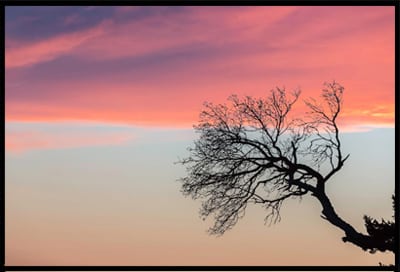
A Precarious Branch
(I call this photo “A Precarious Branch,” which may serve as a useful metaphor for our Quaker identify. It was taken a few years ago on Pender Island, B.C.)
Thanks to a very light business agenda this month we were able to have a rich sharing around “The Evolutionary Potential of Quakerism,” Kenneth Boulding’s 1964 Pendle Hill pamphlet. If anyone is interested, the complete edition is online:
There are a couple things that I want to add to our discussion. The first concerns the traditional Quaker notion of “perfectibility” that Kenneth lifted up. The word can sound so unrealistic and off-putting to our modern ears. As a cradle Lutheran, I found “perfectibility” so very precious and untrue. Our lives are flawed by fear, shame, pride and self-focus, addictions and on and on. How do we dare imagine perfection coming out of all that mess?
Yet there is something inspiring and startlingly daring about the idea of perfectibility, an idea that we indeed ought to lean into and not discard as pie-eyed romanticism. It is a high understanding of our human vocation, the highest. It’s a hard and brave striving. It sees us as being co-creators with God of our very lives! We are called and empowered to become more than we are now; to the work of going beyond our status quo selves into the very mind of Christ or the mind of Buddha, into being more fully alive to the world, to its grandeur and to its needs. In that work we are never done! It is our high and holy calling as human beings, made in the image of the cosmic creator.
The whole trajectory of our evolving universe has been and is still towards greater complexity, greater awareness and consciousness. From obscure, diffuse and seemingly lifeless proto-matter, to stars and planets and rocks and then the grand step into life itself and the still grander step into human consciousness. That has been the unfolding work and play of Divine Wisdom, the feminine Sophia, always at the side of the Original and Unnameable Mysterious One. We can come to trust the Cosmos on its own glorious, immense and still unfolding path. And we are asked to join that process, that unfolding — that perfectibility if you will — to continue this evolution towards a more perfect union, a “One-ing” as Julian of Norwich taught us, another name for which would be love.
The other phrase that Kenneth used to suggest the unique potential of our Quaker tradition is “Experimentalism”: that we may “know God experimentally”. We usually change that word into “experiential,” that we have some direct and unmediated experience of the sacred. While that is also true, we lose something of value from the original old style word ‘experiment’. To experiment is to make a venture, to see what works, what is true and has the power to explain and enlarge our vision of reality. For our Quaker progenitors that central venture and wager of their lives was the real presence of the divine, “That of God,” in each person, each unfolding moment in creation. Does their central experiment still work for us? Does it lift up our living and our working and even our dying? Does it energize us? Does it amplify who we are and who we are meant to be and become in this extraordinary cosmic dance and drama? As Quakers we are practical mystics and scientists of the Spirit! That’s what we can still, on our best days, offer the world: the evolutionary potential of Quakerism.
May it be so!
Stan


